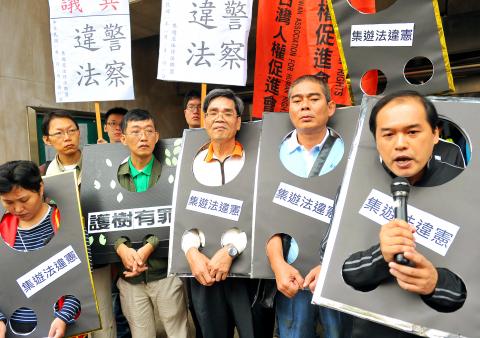Human rights groups renewed their call yesterday for the government to revise the Assembly and Parade Act (集會遊行法), saying it infringes on basic human rights.
Led by the Taiwan Association for Human Rights, the groups gathered in front of the legislature in Taipei and urged the lawmakers to review the proposed revisions to the act during their current session.
They also asked the Council of Grand Justices to respond to a request for a constitutional interpretation of the act filed a year ago.

Photo: CNA
Several clauses in the act, particularly Article 4 and Article 6, have stirred controversy in recent years.
Article 4 prohibits people from advocating communism or secessionism during street protests, while Article 6 states that protests should not be held in the vicinity of the Presidential Office, Executive Yuan or any other major government agencies without prior permission from the authorities.
Tsai Chi-hsun (蔡季勳), secretary-general of the association, accused the legislature of being idle and government officials of “passing the buck.”
She said the demonstrators were appealing mainly for the act to be revised so that protesters could have the freedom to decide whether to notify authorities in advance of demonstrations and not be treated as suspects.
The groups are also pushing for regulation of police and prosecutors’ power to arrest and indict protesters, she said.
Seven or eight versions of revisions have been proposed by different groups since 2008, when a “Wild Strawberries” student protest was held, she said.
That protest began ahead of a visit by Association for Relations Across the Taiwan Strait Chairman Chen Yunlin (陳雲林) to Taipei from Nov. 3 to 7, 2008, and continued for two months.
Tsai said her group only supports the revisions proposed by Chinese Nationalist Party (KMT) Legislator Chu Fong-chi (朱鳳芝) and Democratic Progressive Party (DPP) Legislator Chiu Yi-ying (邱議瑩) because their versions are in line with the group’s views.
The revisions proposed by the Executive Yuan would still require protesters to obtain advance permission for a demonstration, which Tsai said was not satisfactory to her group.
Pan Han-chiang (潘翰疆), head of a tree protection group, said police were “criminals,” and the streets “should be returned to the people.”
Pan was questioned by prosecutors on suspicion of violating the act after he attempted — without permission — to prevent authorities from chopping down old trees in a park to clear the way for the construction of a police station.
Lee Ming-tsung (李明璁), a National Taiwan University law professor who was indicted in 2009 for initiating a “Wild Strawberries” sit-in without permission, said both President Ma Ying-jeou (馬英九) and DPP Chairperson Tsai Ing-wen (蔡英文) were apathetic, and he called on them to take action to amend the act.

Alain Robert, known as the "French Spider-Man," praised Alex Honnold as exceptionally well-prepared after the US climber completed a free solo ascent of Taipei 101 yesterday. Robert said Honnold's ascent of the 508m-tall skyscraper in just more than one-and-a-half hours without using safety ropes or equipment was a remarkable achievement. "This is my life," he said in an interview conducted in French, adding that he liked the feeling of being "on the edge of danger." The 63-year-old Frenchman climbed Taipei 101 using ropes in December 2004, taking about four hours to reach the top. On a one-to-10 scale of difficulty, Robert said Taipei 101

Nipah virus infection is to be officially listed as a category 5 notifiable infectious disease in Taiwan in March, while clinical treatment guidelines are being formulated, the Centers for Disease Control (CDC) said yesterday. With Nipah infections being reported in other countries and considering its relatively high fatality rate, the centers on Jan. 16 announced that it would be listed as a notifiable infectious disease to bolster the nation’s systematic early warning system and increase public awareness, the CDC said. Bangladesh reported four fatal cases last year in separate districts, with three linked to raw date palm sap consumption, CDC Epidemic Intelligence

Two Taiwanese prosecutors were questioned by Chinese security personnel at their hotel during a trip to China’s Henan Province this month, the Mainland Affairs Council (MAC) said yesterday. The officers had personal information on the prosecutors, including “when they were assigned to their posts, their work locations and job titles,” MAC Deputy Minister and spokesman Liang Wen-chieh (梁文傑) said. On top of asking about their agencies and positions, the officers also questioned the prosecutors about the Cross-Strait Joint Crime-Fighting and Judicial Mutual Assistance Agreement, a pact that serves as the framework for Taiwan-China cooperation on combating crime and providing judicial assistance, Liang

US climber Alex Honnold left Taiwan this morning a day after completing a free-solo ascent of Taipei 101, a feat that drew cheers from onlookers and gained widespread international attention. Honnold yesterday scaled the 101-story skyscraper without a rope or safety harness. The climb — the highest urban free-solo ascent ever attempted — took just more than 90 minutes and was streamed live on Netflix. It was covered by major international news outlets including CNN, the New York Times, the Guardian and the Wall Street Journal. As Honnold prepared to leave Taiwan today, he attracted a crowd when he and his wife, Sanni,